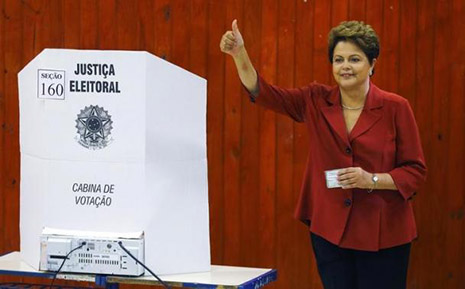Rousseff said in television interviews the changes would be announced next month after broad discussions with industrial and financial leaders, and that they would include reforming Brazil`s onerous tax system.
"I will try to make the changes and reforms that the country needs," Rousseff said in an interview with TV Record. She also said she will soon pick a new finance minister but did not go into detail on the reforms or who she might choose.
Rousseff, 66, won a second term by a slim margin on Sunday, overcoming dissatisfaction with a sluggish economy and poor public services and dashing the hopes of investors who had bet on her centrist pro-business challenger, Aecio Neves.
The victory, driven by strong support among Brazil`s poor, met with cold reality on Monday as Brazil`s financial markets tumbled.
The benchmark Bovespa stock index .BVSP fell 5 percent in early trade and closed 2.72 percent lower while the real currency BRBY ended at 2.52 per dollar, its weakest level since April 2005. Both had already seen heavy losses in recent sessions as Rousseff took a lead in polls.
Shares of state-run companies whose profits have suffered under Rousseff plunged on Monday. That included a more than 12 percent drop for scandal-plagued oil giant Petroleo Brasileiro SA (PETR4.SA), its biggest one-day decline in nearly six years.
Rousseff vowed "not leave a stone unturned" in getting to the bottom of a corruption scandal at Petrobras, and punish those found responsible.
She said confidence would return because Brazil`s economy is still attractive and has $376 billion in international reserves. "We have to wait for markets to calm down and they will."
Finance Minister Guido Mantega, whose departure had already been announced, also tried to beat back pessimism with promises to control inflation and close a budget deficit, although he added that the election showed popular approval for the government`s economic policies.
Despite the reassurances, many investors are skeptical that Rousseff can pull off a swift economic recovery or make a major shift toward business-friendly polices after four years of interventionist measures that failed to spur growth or keep public finances under control.
She now faces the challenge of delivering on campaign promises to expand social benefits for the poor while balancing a strained federal budget.
Fitch Ratings, which rates Brazil`s debt two levels into investment grade, said it will evaluate Rousseff`s ability to revive growth and "address some of the macroeconomic imbalances that have emerged."
Investors hope a more market-friendly finance minister can help restore fiscal discipline, bring transparency to the federal budget and better engage with business leaders.
Some believe that Rousseff will be forced by economic realities to soften some of her policies, but she also faces pressure from her own ruling party to choose a finance minister who if not from the party, is aligned with its thinking.
"What`s essential is that the general lines of economic policy, as they have been practiced, are maintained," Rui Falcao, the Workers` Party president, told reporters.
`BE A BETTER PRESIDENT`
Rousseff won the runoff election with 51.6 percent support against 48.4 percent for Neves and, in a nod to the strong opposition vote, told supporters that she would make changes. "I want to be a much better president than I have been until now."
Her victory came thanks to gains against inequality and poverty since the Workers` Party first came to power in 2003.
Using the fruits of a commodity-fueled economic boom in the last decade, Brazil`s government expanded welfare programs that helped lift more than 40 million people from poverty despite the current economic woes.
The "Brazilian model" won widespread praise and Rousseff`s victory, however narrow, was an important boost for the left in Latin America.
It also means there will be no dramatic improvement in ties with the United States, hit in recent years by trade disputes and U.S. government spying programs that infuriated Rousseff.
About 40 percent of Brazil`s 200 million people live in households earning less than $700 a month, and it was their overwhelming support that gave Rousseff victory.
Rousseff also plans to push for political reform that she says will reduce corporate influence in campaign finance and restore faith in Brazil`s messy multi-party politics.
But she may have a tough time with any far-reaching reforms after her coalition lost seats in both houses of Congress.
"Such a tight result reduces her capacity to radicalize policies," said Alberto Bernal, a Miami-based economist with Bulltick Capital Markets. "Pretty much half of the country is against what she has been doing."
The sluggish economy will also make Rousseff`s second term tougher, straining a government model accustomed to high tax revenues to finance social programs and subsidized credit for companies and consumers.
Brazil`s economy, after growing by as much as 7.5 percent the year before she took office, is on track to expand less than 1 percent this year. Prior efforts to gun growth, largely through tax breaks and other subsidies for select industries, have largely fallen flat.
Inflation, long a problem in a country with a history of runaway prices, is now hovering above the government`s tolerance ceiling of 6.5 percent.
Economists say Rousseff must pursue long-pending tax and labor reforms in order to increase productivity. Few believe there will be major changes, however.
"After a brilliantly executed re-election campaign, Rousseff will need brilliantly executed economic policy to get Brazil moving again anytime soon," wrote Citi analysts Stephen Graham and Fernando Siqueira in a note to clients. "The prospects of that we believe are low."
More about:
















































